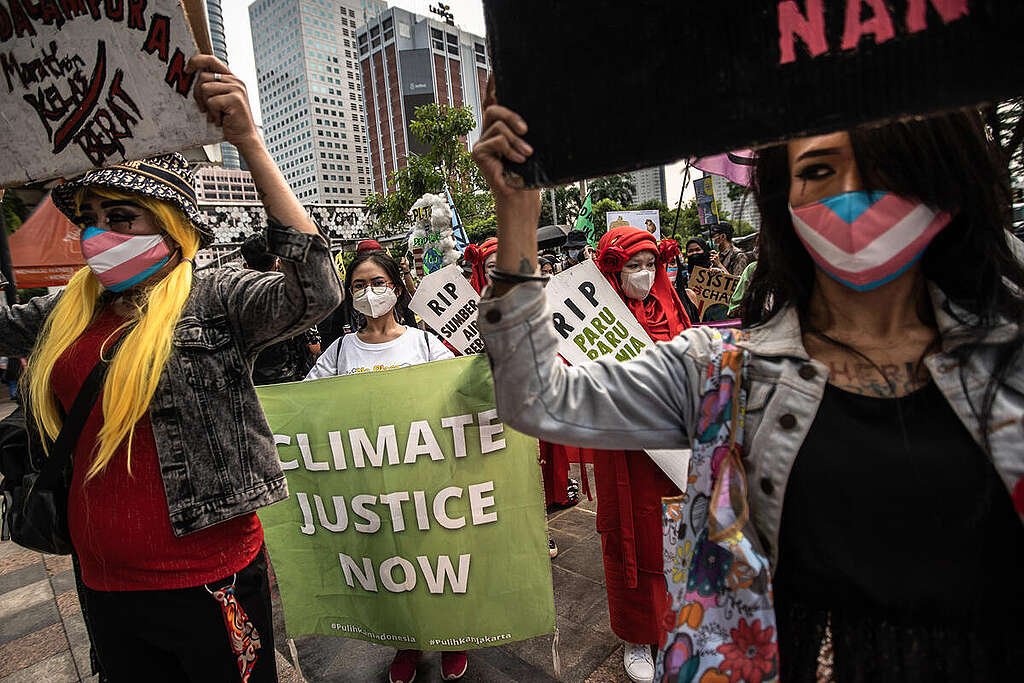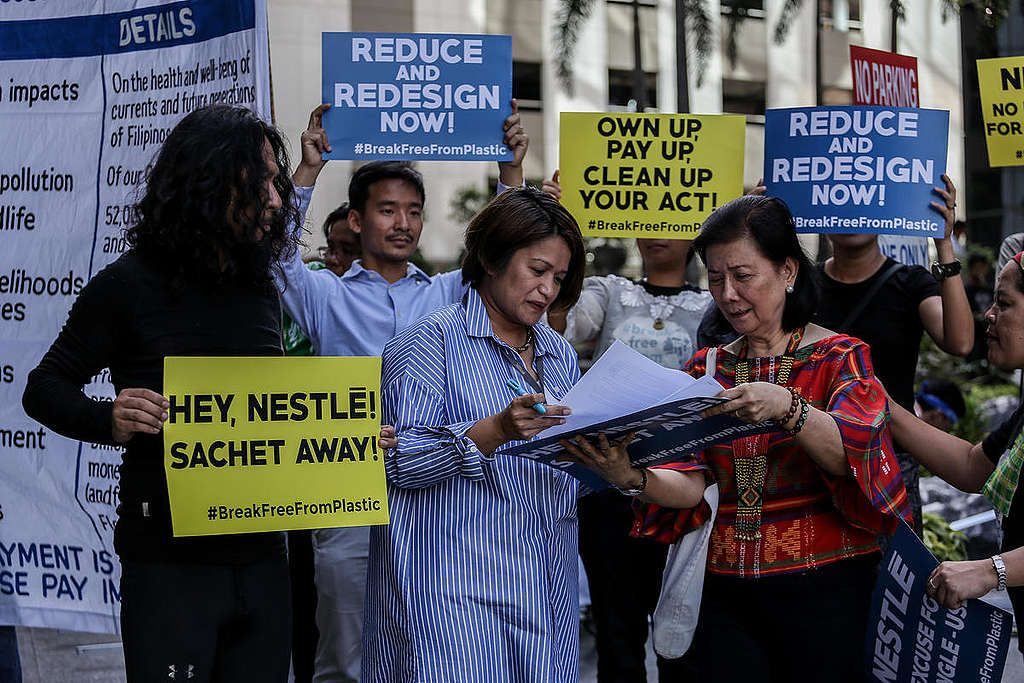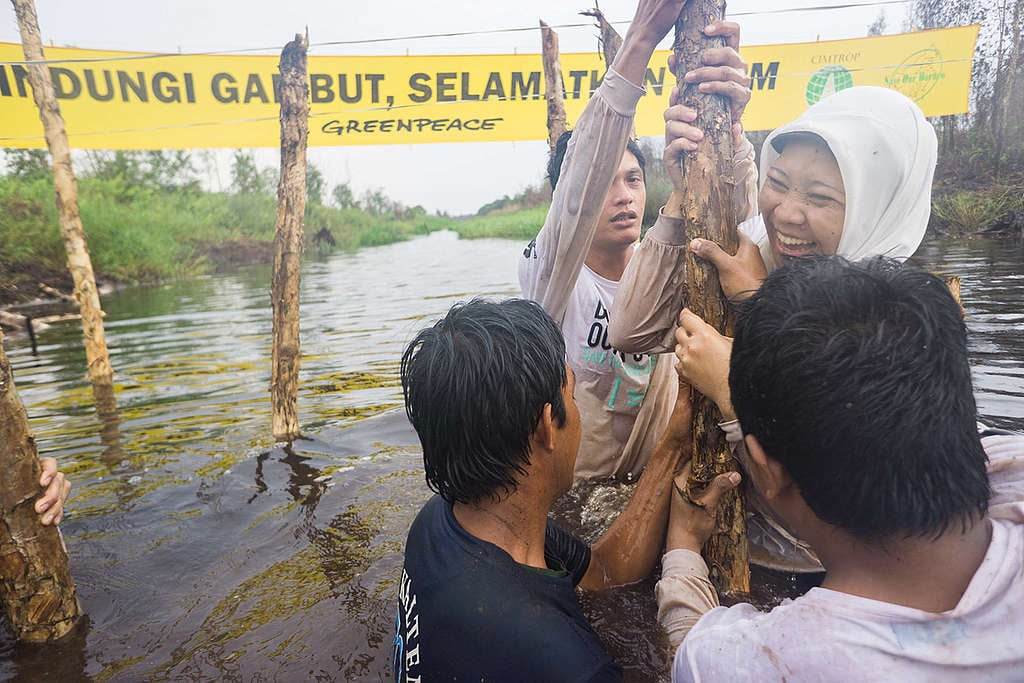This story was originally posted by Greenpeace Spain.
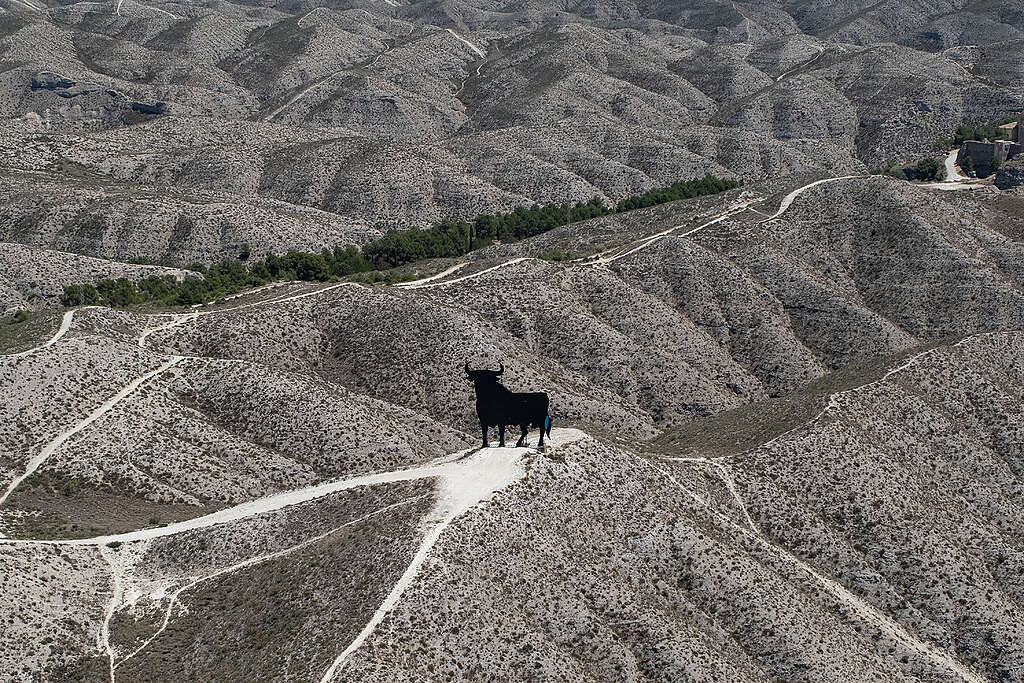
As big polluters plunge the world deeper into climate disaster every day and scientists warn that Earth's life support systems are now "well outside the safe operating space for humanity", action to end fossil fuels and destructive industrial farming is crucial. Here we take a closer look at 10 major environmental problems in one country, Spain - and proposed solutions to tackle the immediate crises and shift towards sustainable living.
Do you recognise similar challenges where you live?
In Spain, temperatures are becoming more extreme, fires more severe, and water shortages increasingly pressing (reservoirs levels are just 37% at the start of September). Seventy five percent of the country's surface area is at risk of desertification. Working with acclaimed photographer Pedro Armestre, Greenpeace Spain compiled a bird's eye view of the impacts of climate breakdown on the country's landscapes, ecosystems and biodiversity:
Pollution by fossil fuels
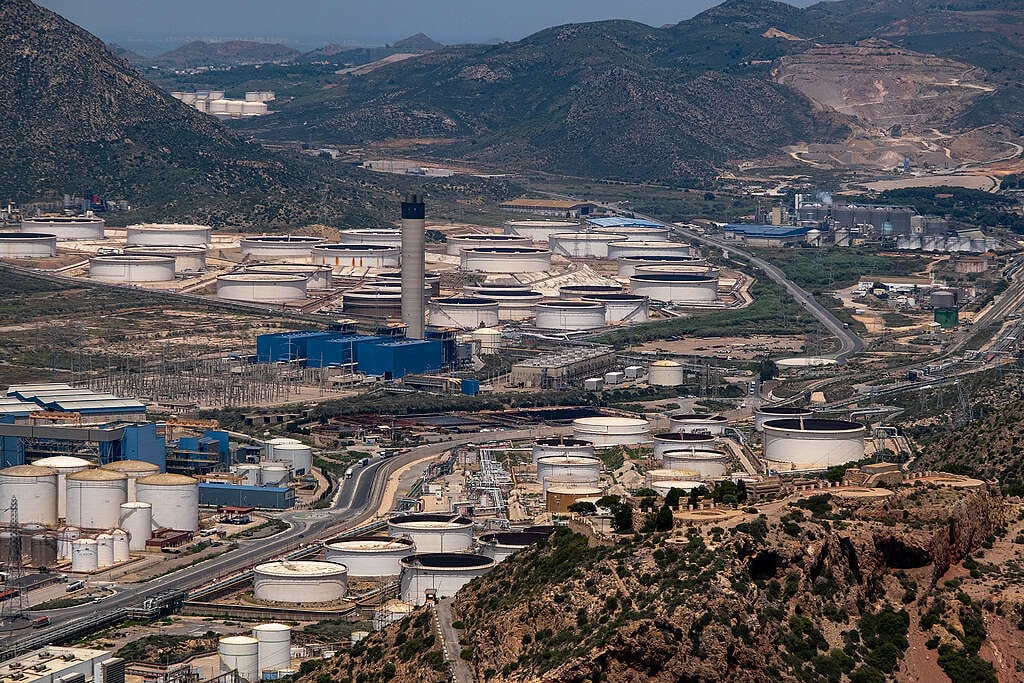
PROBLEM: The fossil fuel industry is the major environmental problem globally and the source of many of the challenges in Spain shown below. Fossil fuels - coal, oil and gas - are by far the main cause of climate breakdown, accounting for more than 75% of global greenhouse gas emissions and almost 90% of all carbon dioxide emissions. The extraction and use of fossil fuels generates toxic and hazardous substances that pollute our air, soil and water with grave impacts human health and the environment. The fossil fuel industry is built on colonialism and injustice. Since the beginning of their existence, fossil fuel companies have been destroying the lives and livelihoods of whole communities, polluting and lying just so they can keep making profits.
PROPOSED SOLUTION: Governments must immediately cut climate-wrecking emissions and end the use of fossil fuels - fast, fairly and forever. We call on leaders to hold big polluters to account and ensure they stop drilling and start paying for harm they've caused. There are many things high emitting countries like those in Europe can do. Energy consumption must be reduced, savings encouraged and energy efficiency improved. A 100% renewable energy system can and must be achieved quickly, without spending a single euro more on new fossil fuel infrastructure.
Call on leaders to stop all new fossil fuel developments, to commit to a rapid and fair phase out of fossil fuels, and to make polluters pay for their destruction.
Drought
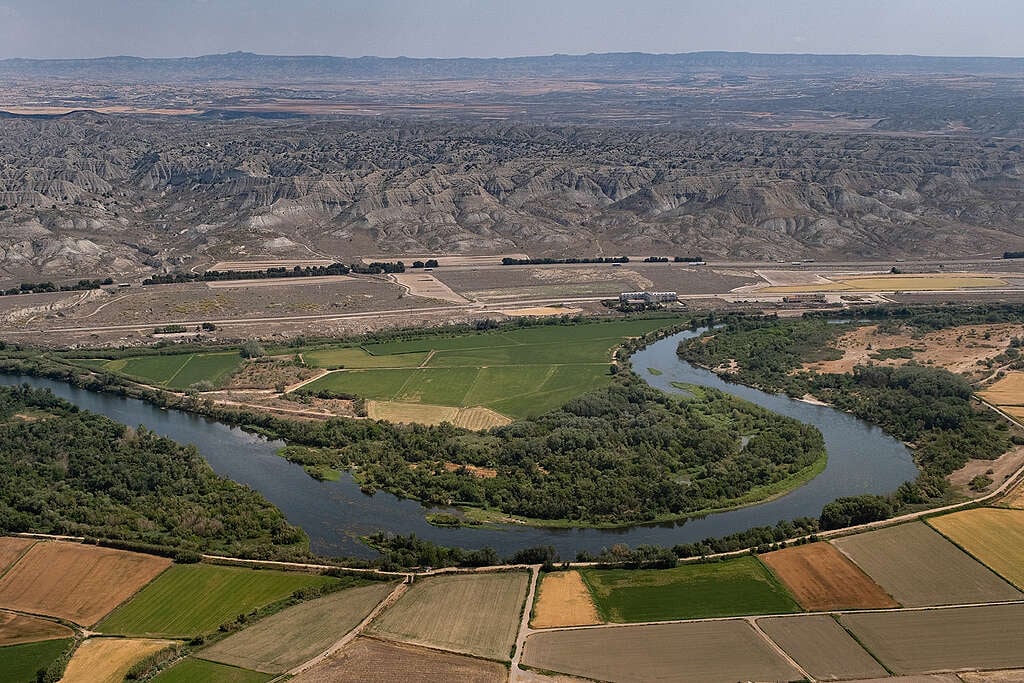
PROBLEM: Scientific data in Spain show a progressive expansion of arid and semi-arid climates which are prone to drought. But the expansion of irrigation projects in these areas continues unabated, without taking the climate crisis into account.
PROPOSED SOLUTION: Action is needed in Spain to stem the growth in water demand for intensive and industrial irrigation and livestock farming, as well as for industry, tourism and urban use. Government needs to protect water catchment areas for human consumption in line with Europe's water protection framework. Establish a just hydrological transition, with a roadmap to adapt irrigation and agriculture to water availability, while ensuring fair distribution to communities and the environment. And guarantee people's right to water, through public management that incorporates progressive pricing for consumption, as well as the most efficient technologies in water saving, purification, recovery and reuse.
Fire
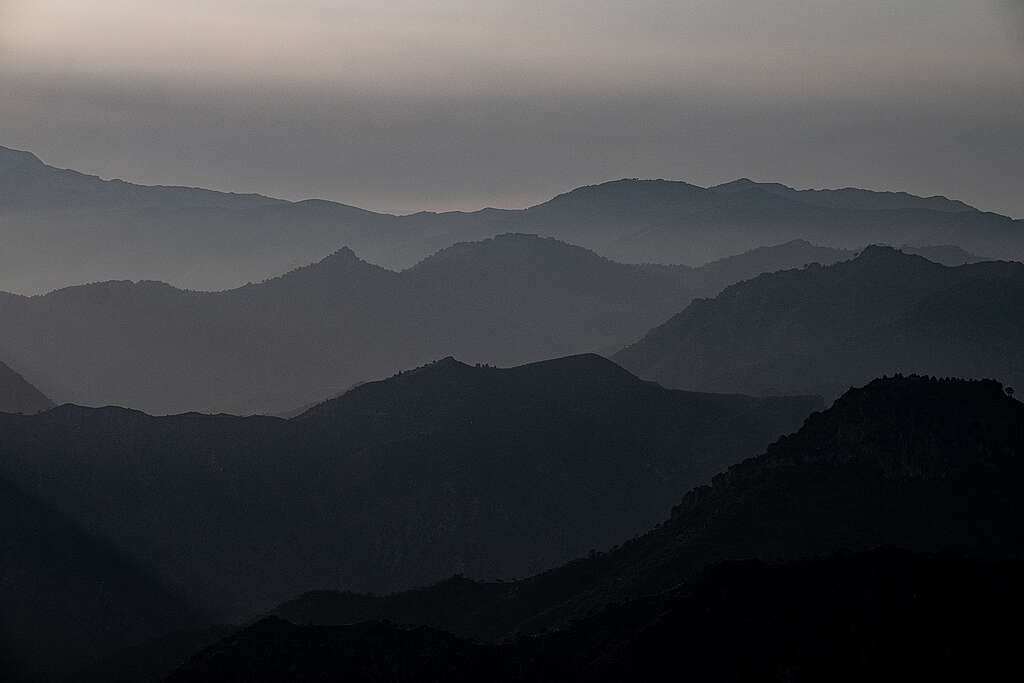
PROBLEM: Fires are no longer a natural disturbance that shapes the landscape but a terrible threat to Spain and other countries as they become more virulent and hard to control. In 2022, hundreds of thousands of hectares were burned in Spain's most devastating wildfires season for a decade. The situation will get worse as the landscape becomes hotter, dryer and more flammable with climate change.
PROPOSED SOLUTION: It's not just a question of putting out fires, they must be prevented. Firefighting campaigns cannot only be linked to the summer season. We must improve forest management all year round to create landscapes that are more resilient in the face of climate impacts. Forestry models need to favour genetic diversity, reduce tree density, and maintain the goods and services provided by the forests, as well as generating employment in rural areas.
Desertification
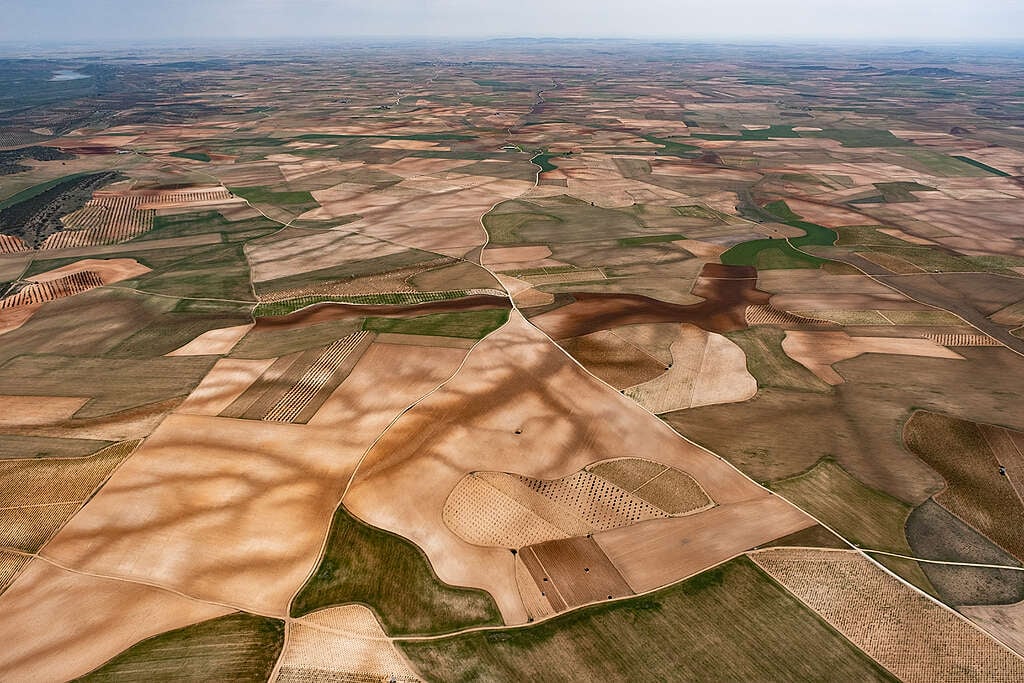
PROBLEM: Spain is one of the most water-stressed countries in Europe and the most threatened by desertification with 75% of its territory at risk. Climate projections indicate that Spain will suffer droughts ten times worse than at present. Prolonged periods of drought and heat will reduce freshwater availability and threaten agricultural yields. This may lead to water shortages and higher food prices.
PROPOSED SOLUTION: Convert the country's current intensive and super-intensive agricultural production to sustainable, diversified and low water consumption farms. Increase organic farming to 30% of the surface area by 2030 and 100% by 2050. To achieve food sovereignty, promote the use of traditional seeds and increase the biodiversity of farms. Develop an adaptation and recovery plan for the most climate-vulnerable agricultural areas, in coordination with the autonomous communities. This should be based on agroecology, soil recovery, regeneration of ecosystems, and protection and restoration of rivers and wetlands.
Loss of biodiversity
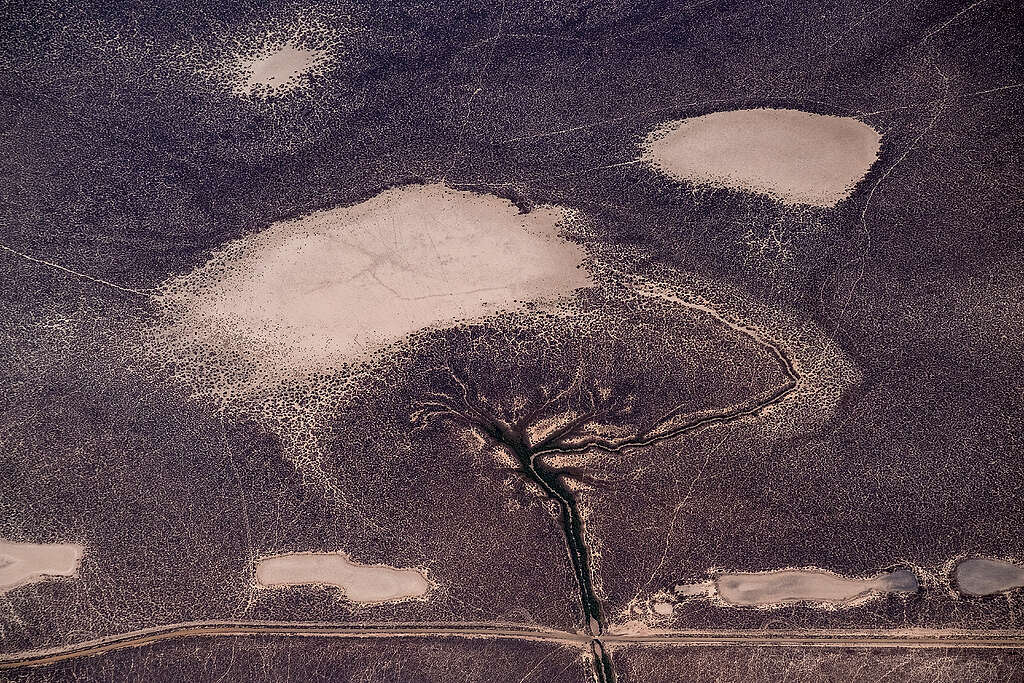
PROBLEM: This dead zone in Doñana national reserve is just one example of biodiversity loss. Driven by human activity, around one million species face the risk of extinction, many in a matter of decades. Of nine planetary boundaries that make Earth habitable, six have been breached, pushing life into the danger zone.
PROPOSED SOLUTION: Globally, protect at least 30% of land and oceans by 2030 at the latest, with an agreement that respects the rights of Indigenous Peoples, who play a leading role in conserving nature, and supports local communities. In Spain, this requires implementing the National Adaptation Plan to climate change threats, and including long-term nature-based solutions. At European Union level, we must support urgent adoption of an ambitious Nature Restoration Regulation to help guarantee the preservation of restored ecosystems while taking into account the sectors that manage and use the territory.
In areas such as Doñana, the solution must be immediate: prevent irrigation schemes that are sucking it dry; close illegal wells; and end impunity for crimes related to the theft and pollution of water.
Pollution from industrial agriculture
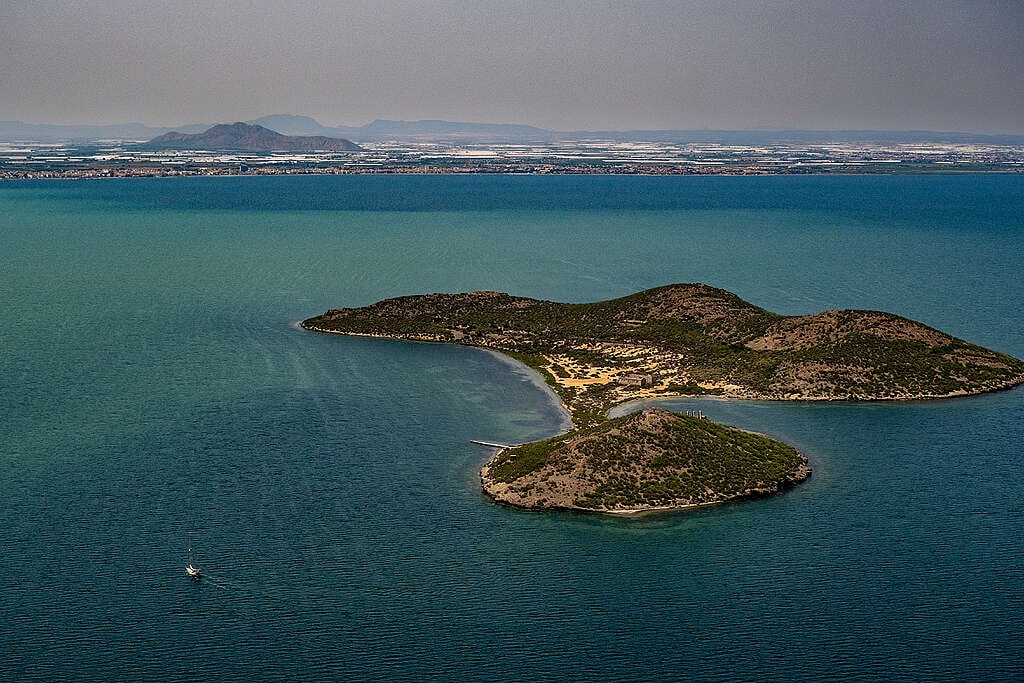
PROBLEM: Industrial agriculture is destructive. It consumes unsustainable quantities of water. It uses chemicals such as fertilisers and pesticides that contaminate aquifers, soil and food (and cause climate-damaging greenhouse gas emissions). And it reduces biodiversity. It also harms small producers and consumers by concentrating control of agricultural business in a few hands and threatening food sovereignty. Globally, 76% of the agrochemical market is controlled by six multinationals and 53% of the seed market by three.
PROPOSED SOLUTION: The answer we see in Spain is agroecology: the application of ecological concepts and principals in farming. We have to reconvert agricultural production to sustainable farms, reduce water pollution caused by the excessive use of synthetic fertilisers and prioritise places with affected natural areas that are high in biodiversity, such as Mar Menor (pictured above). As part of the EU's Common Agricultural Policy (CAP), Spain must ensure that environmental requirements are not lowered and promote a future CAP that is socially just and responds to current climate challenges and biodiversity loss.
Pollution from industrial livestock farming
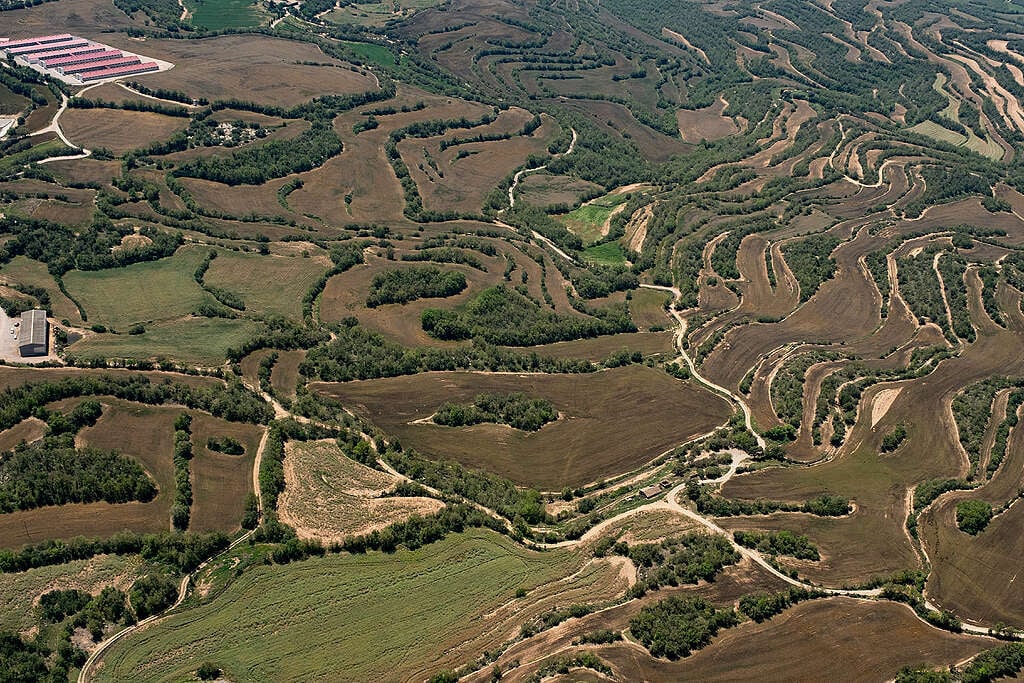
PROBLEM: Slurry from industrial livestock farming is a pollutant and directly affects the groundwater and biodiversity of the area. In many parts of Spain, people are already drinking water with levels of nitrates above the permitted levels. The problem is so serious that the European Commission has opened an infringement procedure and sent a reasoned opinion to the Spanish government.
PROPOSED SOLUTION: An end to factory farming. Ban new industrial livestock projects and the expansion of existing ones, and eliminate subsidies. We must reduce intensive livestock farming in Spain by 50% by 2030 and promote a just transition for existing farms. This means ensuring that the Public Sector Contracts Act favours small local production while guaranteeing them support and services. This can prevent the loss of population in rural areas. Implementing tax exemptions and support for individuals and businesses in the green transition by applying the polluter pays principle. Strengthening the transition budget and bring green taxation to the level of the European average. Eliminating VAT on all organic food and increasing VAT on red meat and ultra-processed products.
Additionally, create and distribute a basic social basket of organic, local and seasonal food to vulnerable families, promote a diet that is high on plant-based foods and low in animal-based foods, and reduce food waste in the country by at least 50% by 2028.
Mass tourism
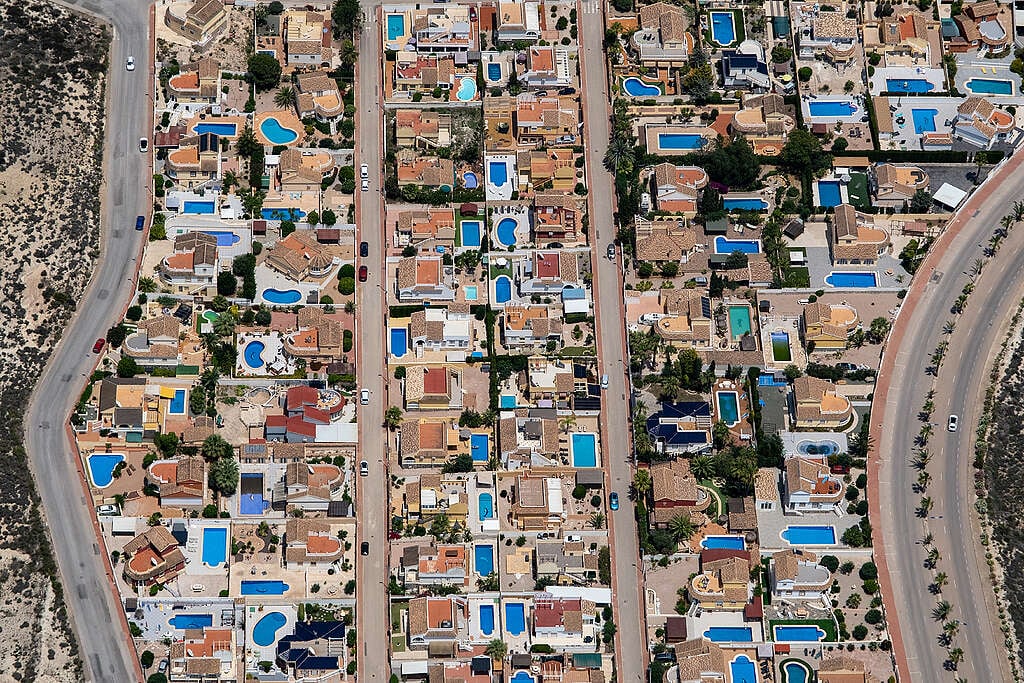
PROBLEM: Over the last 30 years the built-up area of Spain's coast has doubled. Many ecosystems have been destroyed, reducing their biodiversity and their benefits. With millions of tourists arriving on Spanish coasts each year, the human impact increases demand for water, energy, transport, and raises levels of solid waste, sewage and polluting gases. This leaves a saturated coastline unable to generate the goods and services necessary for future sustainable development.
PROPOSED SOLUTION: Tax mass tourism and promote tourism that recognises the natural, cultural and heritage value of the territory. We need adequate planning that takes into account the carrying capacity of the environment and seeks a social and ecological balance. The number of protected areas on the coast should be increased and green infrastructure and corridors created to protect essential ecological processes. Ensure the 100% purification of inland wastewater and an end to polluting discharges into the sea.
Plastics
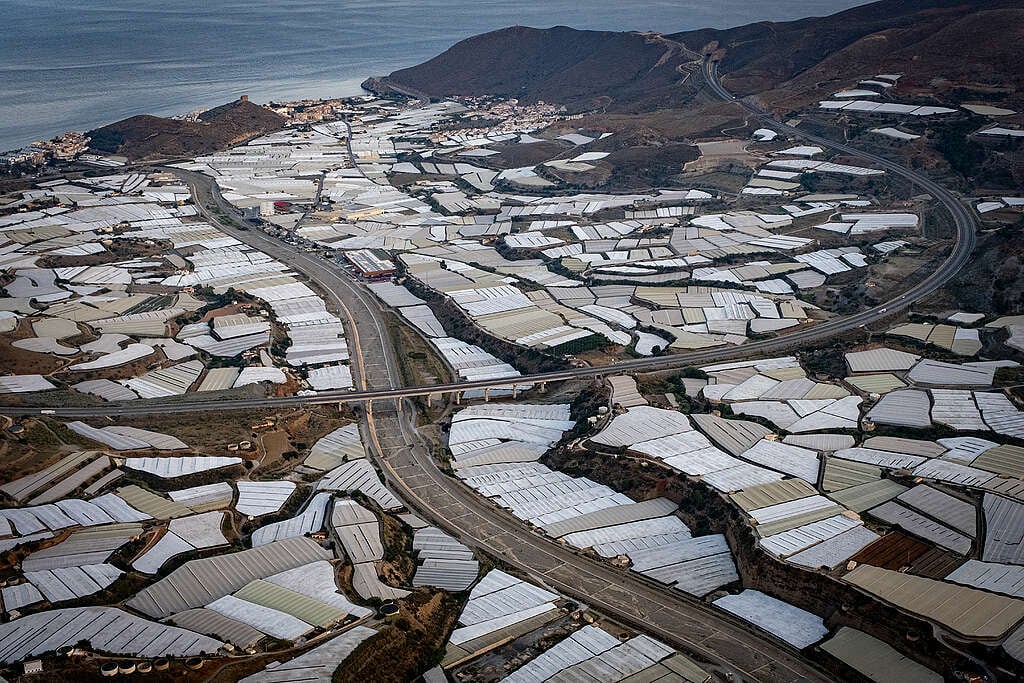
PROBLEM: Plastic waste does not only come from industrial agriculture but, as pictured, these 'seas' of plastic add to the tide of plastic pollution that is choking our waterways, beaches, seas and oceans. Not even 30% of plastics are recycled in Spain.
PROPOSED SOLUTION: Recycling is not the solution. The current system must be reformulated with policies implemented for reduction and reuse. Recycling companies cannot be allowed to export plastic waste to unlicensed operators in low- and middle-income countries. As well as demanding that massive consumer goods companies end unnecessary throwaway plastics; and that governments deliver a Global Plastic Treaty; we must promote conscious, critical and responsible consumption.
In Spain, we can start with education in schools to build skills for sustainable consumption. Demand durability and repairability of products. And ban planned obsolescence by enforcing Consumer Guarantees Act, which gives consumers the right to seek a repair or a replacement from the manufacturer.
Demand that massive consumer goods companies reject unnecessary throwaway plastics and commit to making reusable or refillable packaging.
Environmental impunity
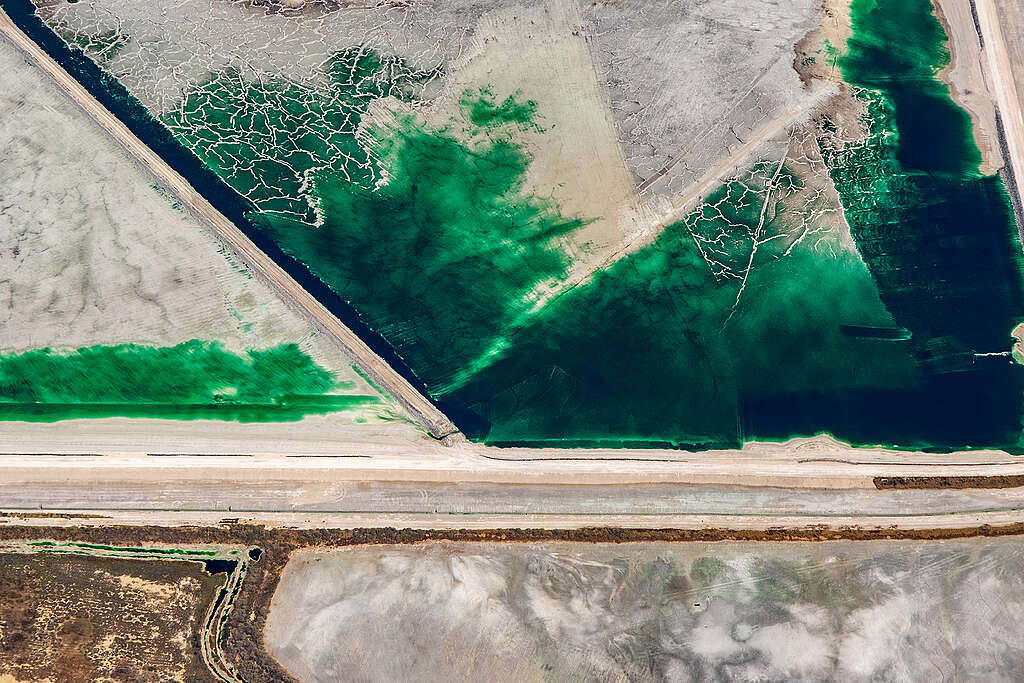
PROBLEM: For years, chemical manufacturing company Fertiberia has been damaging the health of the environment and people who have been exposed to its toxic, dangerous and radioactive industrial waste. Social and environmental organisations have been challenging Fertiberia in the courts for 13 years. And yet, this summer, the Junta de Andalucía granted further authorisation. This is not the only polluting project that has gone unpunished in Spain, where economic interests of a few still prevail over our collective welfare.
PROPOSED SOLUTION: End the impunity in which polluting industries operate. In Spain, let's start by ensuring a responsible mining standard, based on reduction, through the sufficiency principle, taking into account impacts in other regions and countries. Ensure effective environmental protection in line with European regulations. And make the development of mineral recycling a priority.
Companies must be held to account for damage caused to people and nature, and made to comply with court rulings, locally, nationally and internationally.
Take action
Environmental injustice problems can seem so big that they are overwhelming, but there are solutions. People power is real and with hope and determination there are many ways we can take action together for a better world.
We act with hope and determination. We take on the impossible. We are everyday people connected around the world, embarking on a billion acts of courage.
Julio Barea Luchena is a consumer and biodiversity campaigner and Laura Chinchetru is a communications manager, both at Greenpeace Spain.

